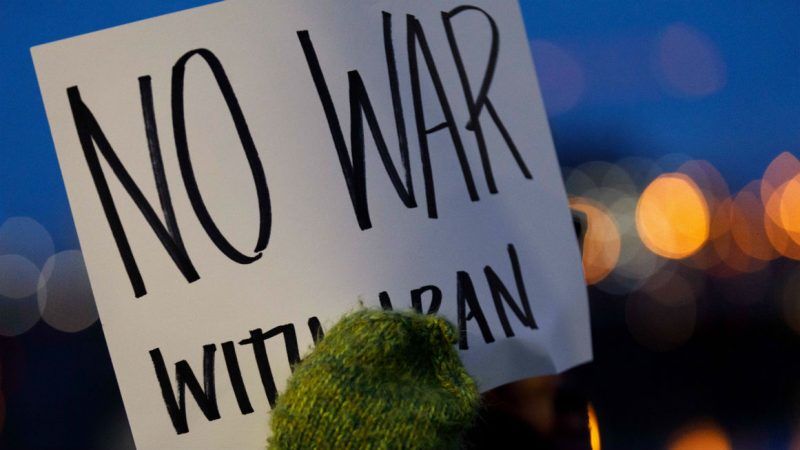Escalation Breeds Escalation, in Iran and Beyond
Washington's dangerous reliance on military intervention does not serve American interests, increase our security, or put us on a path to peace.

The assassination of Gen. Qassem Soleimani, commander of Iran's Quds Force, begins a new decade of American foreign policy by perversely recommiting us to the errors of the old one. With Soleimani's death, President Donald Trump capped months of uncertainty in U.S.-Iranian relations with a lurch toward war.
Iran's face-saving missile strikes on Tuesday had no casualties, and Trump appears to be wisely taking this as an offramp from open conflict. But it's only a matter of time before we again start hearing the war drums calling for regime change in Iran. Escalation breeds escalation. "IRAN WILL NEVER HAVE A NUCLEAR WEAPON!" Trump tweeted Monday morning, but his short-sighted tactics make it more likely that Iran—to say nothing of other adversarial states, such as North Korea—will seek a nuclear deterrent.
This paradox is not unique to this administration. Washington's bipartisan military-first approach to foreign affairs broadcasts to bad actors worldwide that U.S. intervention is always at hand and that a nuclear arsenal is the only sure deterrence against it.
North Korea has affirmed this logic explicitly. "History proves that powerful nuclear deterrence serves as the strongest treasure sword for frustrating outsiders' aggression," a state-run media editorial declared in January 2016. Neither Iraq's Saddam Hussein nor Libya's Moammar Gadhafi, both deposed and killed with U.S. involvement, could "escape the fate of destruction after being deprived of their foundations of nuclear development and giving up undeclared programs of their own accord," the editorial continued. North Korea's Kim Jong-un is visibly determined not to follow in their footsteps.
For all its imperfections, the Joint Comprehensive Plan of Action (JCPOA)—better known as the "Iran deal"—presented an opportunity to break this pattern. Unfortunately, that opportunity is gone following Trump's withdrawal from the agreement in 2018. After the Soleimani strike, Tehran announced its own exit from the plan and, with that, its intent to proceed with nuclear research and development at will.
Before Trump left the JCPOA, independent observers repeatedly verified Iran's compliance. As recently as this past fall, with halting but sometimes promising talks between Washington and Tehran underway, Iran's initial steps away from compliance were not a sprint toward nuclear warheads so much as a lunge for leverage at the negotiating table.
That lunge was part of a broader foray into provocation, which in turn was Iran's response to the administration's "maximum pressure." That reckless Trump policy consists of leaving the nuclear deal, reinstating harsh sanctions that the agreement had repealed, and expanding the U.S. military presence in the Middle East, including stationing thousands of American forces to defend Iran's regional rival, Saudi Arabia, and keeping troops in Iraq "to watch" neighboring Iran.
Such pressure, the White House assured us, would force Iran to come begging for relief at any cost. It failed.
Far from humbling Iran, maximum pressure multiplied the political capital of Iranian hardliners and pushed us closer to open conflict. It raised the specter of direct U.S. military intervention and, with it, the nagging perception that nuclear weapons are the single reliable guarantee against it. Even if Iran does not build a nuclear arsenal, the last year has more than demonstrated that Tehran will not passively defer to Washington's coercion, the Soleimani strike included.
Whether we are now "at war" with Iran is impossible to say. In another time, one nation taking credit for bombing another nation's high-ranking military official—however dastardly his record—would unquestionably be an act of war. But Washington has long since abandoned old constraints of conflict; wars don't formally begin anymore, and they certainly never end.
The most probable outcome is that Washington will sleepwalk into a new theater in what I suspect historians will record as Washington's multi-front Hundred Years' War of the Greater Middle East. But it may not be too late to change course, to learn the lesson that escalation breeds escalation, and to apply that lesson both here and elsewhere. Even the most powerful nation on earth cannot act without regard for cost and consequence. Constantly threaten conflict with simplistic shows of "strength," and conflict is what you'll eventually get.


Show Comments (322)